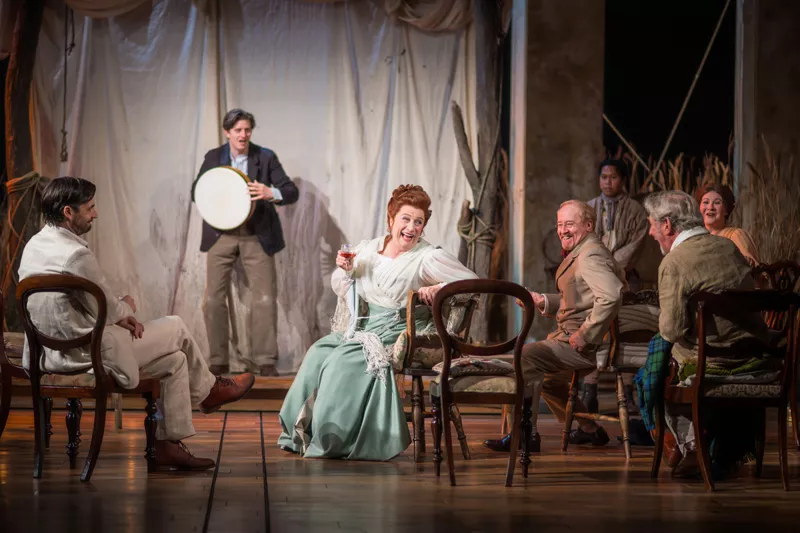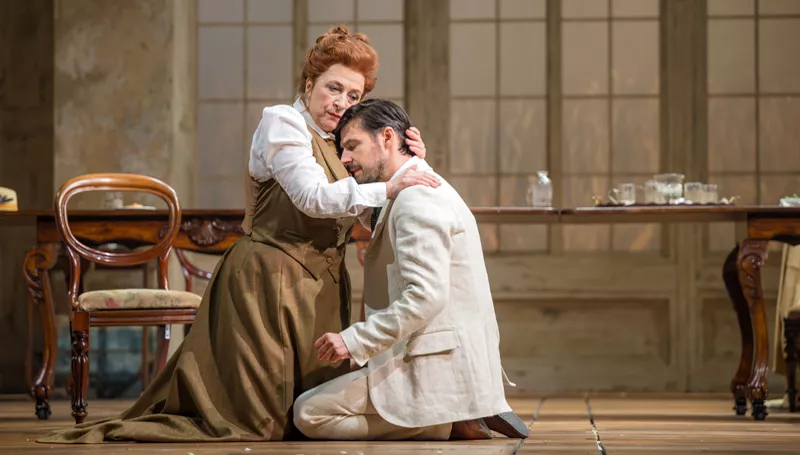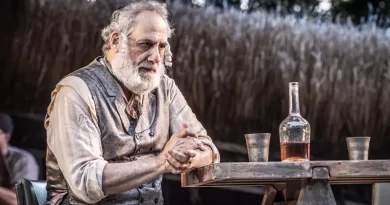“The Seagull”, Royal Lyceum, Edinburgh
Mark Brown in Scotland’s capital
16 October 2025
★★★★☆
The first thing one notices about the Royal Lyceum Theatre, Edinburgh’s new staging of Chekhov’s 1896 play The Seagull is the extraordinary quality of the cast. For his first production as artistic director at the venue, James Brining has secured the services of the excellent Caroline Quentin in the all-important role of the self-regarding actress Irina Arkadina.

Photo credit: Mihaela Bodlovic.
However, Ms Quentin’s name is only the headline of a universally impressive cast list that includes such outstanding figures as John Bett (as Arkadina’a brother, the doleful estate owner Sorin) and Forbes Masson (who plays the droll local GP Dr Dorn). The casting of the ever-superb young actor Lorn Macdonald (as Arkadina’s restless son Konstantin) is inspired.
The play is built around Arkadina’s visits to her family’s country estate. Famous, self-consciously glamorous, parsimonious and a neglectful mother, the great thespian requires that she be the sun around which her rural family and friends revolve.
It helps – as Brining’s casting of Quentin in the lead role attests – if Arkadina is played by an actress who has herself achieved a significant degree of fame. In the UK in recent decades the character has been performed by such doyennes of stage and screen as Dame Judi Dench (1994), Fiona Shaw (2003) and Cate Blanchett earlier this year.
Quentin brings to the role a tremendous sense of satirical comedy. She plays the repulsive self-centredness and shameless fakery of her character with a bold energy.
However, there is, behind Arkadina’s monstrous exterior, a brittle fragility and emotional emptiness. Quentin captures this somewhat hidden aspect of her character’s persona in a performance that is, paradoxically, garish and nuanced.
Her ludicrously overblown speech to her younger lover (the writer Trigorin, played by the fine Welsh actor Dyfan Dwyfor) – who, she fears, is about to leave her for the young would-be actress Nina (played with delicacy and robustness by Harmony Rose-Bremner) – is a case in point. Quentin’s Arkadina pleads with her lover in preposterously melodramatic terms.
In one comic moment, she even looks aside to the audience, underlining the fact that the phoney emotion of her speech is a joke that we are in on. Nevertheless, even while she is hamming things up, Quentin also manages to betray the very real vulnerability of her character.
Mike Poulton’s adapted script is played on an impressive, large-scale set (which is brilliantly designed by Colin Richmond and expertly lit by Lizzie Powell) that subtly represents the symbolic decline of the once great estate. Chekhov’s drama reflects with undeniable depth and sensitivity on the decay of the Russian landowning class and the growing chasm between the country and the burgeoning, industrializing cities.
Indeed, so profound are the playwright’s social and emotional insights that one might consider his works to bear an almost prophetic relationship to the Russian revolutions of 1905 and 1917.
The drama’s complex web of unrequited loves and illicit affairs speaks to a poisonous stasis in the lives of Chekhov’s characters. We see this reflected in Tallulah Greive’s almost gothic playing of the bored and frustrated young woman Masha.
Nowhere is the gulf between ambition and reality manifested more sharply than in Macdonald’s playing of Konstantin who seems to channel both Hamlet and Samson in a performance that is, like the play itself, deceptively understated, yet shudderingly tragic.
Until 1 November: https://lyceum.org.uk









